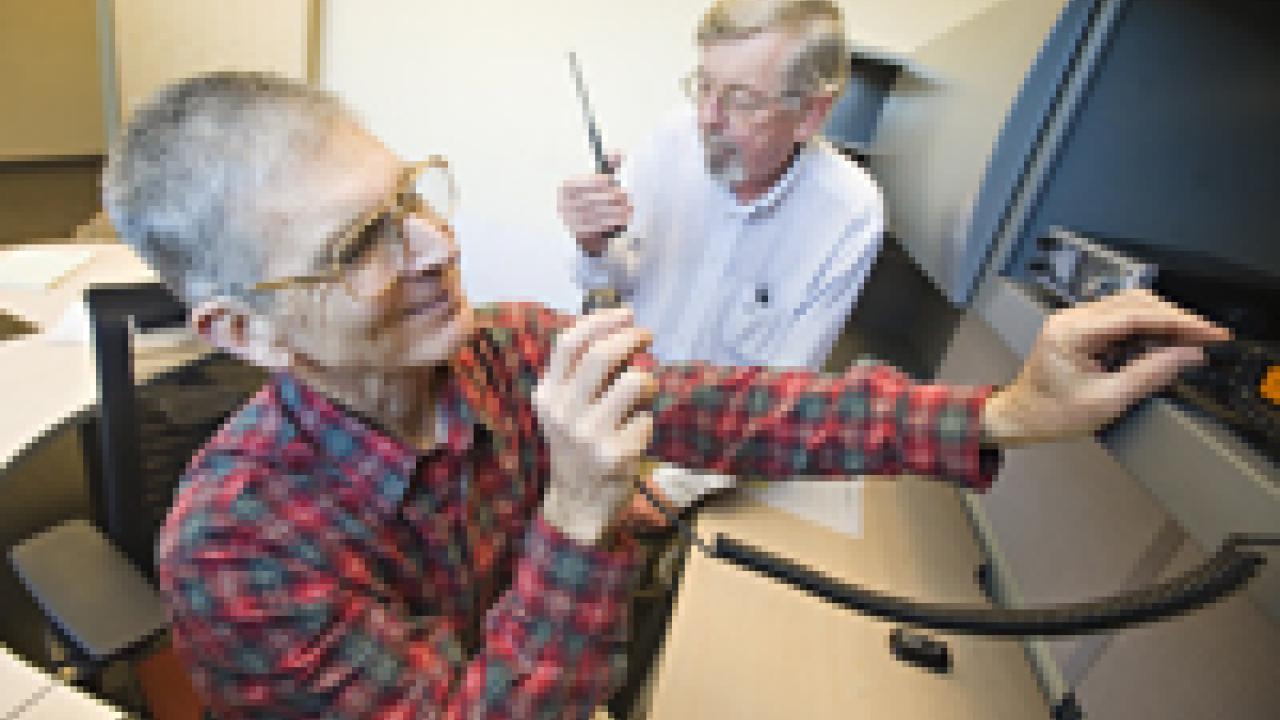A lone voice rode out on a very high frequency into amateur radio bands to conduct a roll call. And one by one, about a dozen UC Davis volunteers transmitted their call sign and reported their locations across campus.
It was the weekly check for the recently established UC Davis amateur radio group, an important part of the university’s plan for communicating across campus and with other agencies in an emergency.
“It’s a backup communication system that is outstanding in communicating when other systems are overloaded,” said John Berg, who helped found the group and is a member of the campus team that regularly trains and coordinates response to emergencies.
Berg works as a laboratory manager in the Department of Chemistry and is known on the airwaves as K6JRB. After the 2007 shooting tragedy at Virginia Tech, he responded to a chancellor’s message about campus safety initiatives and offered to help set up an amateur radio group.
Amateur radio, which transmits and receives messages on radio frequencies set aside for noncommercial use, is a reliable and powerful means of emergency communications when telephone, cell phone and Internet services are overloaded or damaged.
UC Davis recently purchased a transmitter/receiver and scanner for its base station, adjacent to the Emergency Operations Center, and installed an antenna on top of the building. “It’s a really big achievement,” Berg said.
In an emergency, a controller at the UC Davis base station would dispatch group members to areas of campus where communication support was needed. The base station would feed information to and from the campus emergency operations team.
Currently, the amateur radio group includes men and women from across campus. Some have been licensed for more than 40 years; others have just earned their license.
Gary Matteson, who is a researcher in biological and agricultural engineering and WA6TQJ, performed the recent net check. Among others, Gary Ford, associate vice provost for undergraduate studies and call sign N6GF, reported in from Mrak Hall.
Nancy Flagg, budget and finance manager for Student Affairs and KI6KWB, responded from the South Silo. And nurse practitioner Pamela Porter, or N6OLO, checked in from the Cowell Student Health Center.
Other ham radio operators from Sacramento and Vacaville reported in as guests. “You’ve got a great signal,” said Greg
Kruckewitt of Vacaville, also known as KG6SJT. “It’s booming right in down here.”
Alison Kent, publications coordinator for the Wildlife Health Center and KI6IMU, earned her license two years ago and values the chance to provide help in an emergency. “Last year when we had the big storm,” she said, “here were the hams with all their backup equipment.”
Diana Cox, emergency and continuity planner for the campus and also a licensed ham radio operator, is recruiting other members of the campus community—including students—to participate in the amateur radio group.
While amateur radio operators must be licensed by the Federal Communication Commission, Cox said, people should not be intimidated by the little bit of studying it takes. The written test covers some electronics theory and amateur radio rules and regulations. The FCC recently eliminated a Morse code requirement.
The UC Davis group conducts its weekly checks at 12:30 p.m. on Mondays at 146.475 MHz. For more information, call Diana Cox at (530) 754-2559.
Media Resources
Clifton B. Parker, Dateline, (530) 752-1932, cparker@ucdavis.edu
